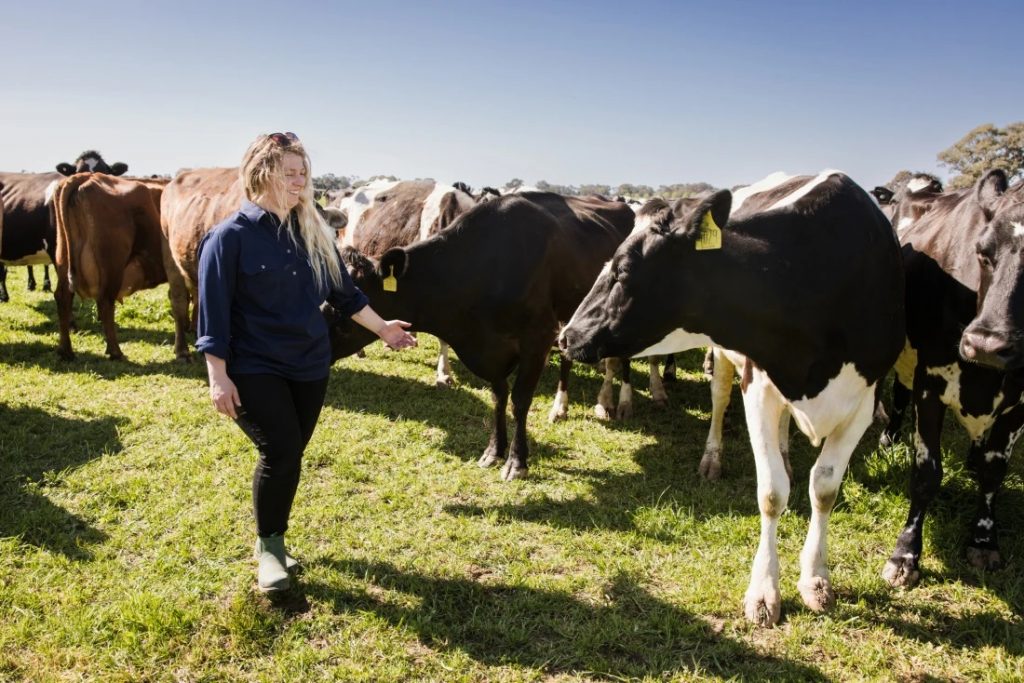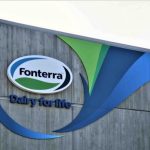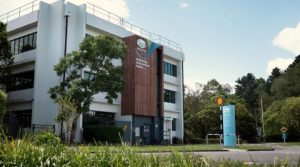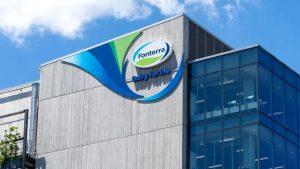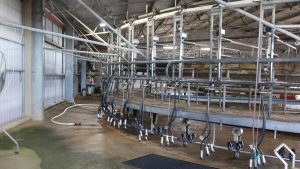
Victorian dairy farmer Celia Hobbs has never looked back since she changed her processor to Fonterra in 2021.
“They were phenomenal from the start,” says Hobbs, who milks about 150 cows with her partner and in-laws at a property near Echuca in the state’s north.
“In the first three months since moving across, we had a pretty big weather event, a lot of rain,” she says. “It was not the greatest environment to start out. But Farm Source [Fonterra’s farmer service offering] helped us to keep on milking. They helped us through that.”
Fonterra hasn’t just helped out in a crisis, it’s also provided advice on improving productivity, helped Hobbs roll out an environmental management plan and, through the Farm Source app, provides real-time data to track the performance of her business.
“We barely knew our previous processors’ manager. Within two months, we knew the whole Fonterra team,” Hobbs says.
This true partnership approach with dairy farmers – its “customers” – is why one of the world’s biggest dairy companies is a leader in The Australian Financial Review 2024 Customer Champions list in the Established Business to Business category.
Hobbs is one of more than 600 dairy farmers based in Victoria and Tasmania who have helped Fonterra’s Australian business report $2.3 billion in revenue in FY23 and earnings before interest and tax of $67 million.
(In New Zealand, where it is the country’s biggest company, Fonterra partners with more than 9000 dairy farmers and reported revenue last financial year of $NZ22.8 billion and profit before tax of $NZ1.4 billion.)
Fonterra’s managing director of Oceania and global markets, René Dedoncker, says the company’s relationship with farmers is “fundamental” to the competitive advantage and success it enjoys in the dairy industry.
“We have a 98 per cent retention rate of farmers in Australia alone,” he tells The Australian Financial Review.
This high retention rate is a factor of how Fonterra treats its farmers, a relationship it has been working on for some time, primarily through its Farm Source offering, which provides many services aimed at improving a farmer’s livelihood.
“You go back five to six years and every processor would treat farmers the same,” Dedoncker says. “There would be a rep who looked after the farmer and would answer their call, and a tanker would turn up to collect their milk.
“We’ve changed our service operation into one that focuses on adding value to our farmers’ businesses.”
These services include providing agronomists – plant and soil scientists – who help farmers create the most value out of their paddocks so they can participate in the full cycle of milk production.
“It’s about ensuring they have enough to feed their herd, knowing when they need to buy hay and supplements. We even help them buy feed on futures markets,” Dedoncker says.
Check the app
Farm Source “hit teams” also include HR specialists to help farmers ensure they have the right contracts with workers, financial planners to assist with expansion plans or upgrading their equipment and experts to help them establish an environmental plan so they can map their carbon footprint.
Technology is at the heart of the Farm Source offering. Via an app, farmers can get updates on their milk production – comparing their performance with the year before – and know where the milk tanker is and when it will turn up.
“Farm Source is a huge point of difference [in the market]. It’s a big part of the reason why farmers stay with us, because of the value we provide in that space,” Dedoncker says.
“Our service offering keeps evolving. It needs to change, to be progressive and improve efficiencies.”
This feeds through to the profitability of Fonterra and its dairy farmers.
This need to continually improve was encapsulated in Fonterra’s revised strategy for growth over the next decade and beyond, which it unveiled in September.

It includes delivering the “strongest farmer offering” by “working alongside farmers to enable on-farm profitability and productivity, and support the strongest payout”.
While Australian farmers don’t have an ownership stake in Fonterra and so don’t get dividends on top of the price they get for their milk, they are rewarded at the farmgate – in the previous dairy milk season, Aussie farmers received on average $9.20 per kg of milk solids.
Clarity on earnings
Transparency is also a key feature of Fonterra’s relationship with its farmers – for some time it has publicly declared its earnings in Australia, following a request from local farmers.
“By declaring our Australian earnings, farmers know what we are keeping, what we are investing into the business and what proportion of our Australian earnings we are sharing with farmers and how we build our milk price,” Dedoncker says.
Fonterra has also created an Australia Suppliers Council to provide input on key decisions around strategy, while there are regular catch-ups with local farmers and tours of their properties.
The healthy state of its relationship with farmers is backed up by customer metrics and independent surveys.
Fonterra’s farmers delivered a high net promoter score of +57, and it ranked first in the grocery and foodservice categories in the Advantage Survey, an annual survey where major retailers such as Coles, Woolworths and Metcash rank the performance of their suppliers.
Dedoncker says another key reason why farmers are so loyal to Fonterra is because of the famous Aussie brands.
“Farmers are proud of the brands we make, like Western Star, the largest butter brand in the country and Perfect Italiano cheese,” he says. “They love that the milk they produce goes into products that feed mums, dads and children around the country.”
While Aussie dairy farms may be disappointed by Fonterra’s plans to sell its Australian business and exploring the sale of some of its consumer brands (following a strategic review in May) a spokeswoman offered some reassurance.
“In terms of what it means for dairy farmers in Australia, it is our expectation that the excellent relationships that have been developed with Fonterra would continue, however potentially under a different ownership structure,” she says.
You can now read the most important #news on #eDairyNews #Whatsapp channels!!!
🇺🇸 eDairy News INGLÊS: https://whatsapp.com/channel/0029VaKsjzGDTkJyIN6hcP1K
